Apr
26
It’s easy to identify the common cold: scratchy throat, runny or stuffy nose, sneezing, slight aches and pains, and a cough. It’s not as easy sometimes to navigate through the library’s list of databases to find one that fits your needs. Here are 2 great go-to databases where you can find the resources that you need for practically any class assignment. They are easy to use, multidisciplinary, and contain not only scholarly articles but also newspaper and magazines articles, book reviews, and more!

Academic Search Premier – EBSCO
The world’s largest scholarly, multidisciplinary full text database. Find journal, newspaper, and magazine articles, book chapters, primary sources, and educational reports. Document types include case studies, directories, poems, literary criticism, interviews, etc. This scholarly collection offers information in nearly every area of academic study.
Pros and Cons:
![]() Contains a lot of full text articles (nearly 4,500 journals, including more than 3,600 peer-reviewed titles). When you’re in a hurry, this is especially helpful.
Contains a lot of full text articles (nearly 4,500 journals, including more than 3,600 peer-reviewed titles). When you’re in a hurry, this is especially helpful.
![]() Multi-disciplinary means you’ll be able to find information on practically any topic. This makes it a great place to start researching for any class.
Multi-disciplinary means you’ll be able to find information on practically any topic. This makes it a great place to start researching for any class.
![]() It’s easy to search multiple EBSCO databases at once by clicking on “Choose Databases” (found above the search boxes). This will help to cut down searching time because many databases can be searched at once.
It’s easy to search multiple EBSCO databases at once by clicking on “Choose Databases” (found above the search boxes). This will help to cut down searching time because many databases can be searched at once.
![]() Not everything written about a particular topic will be found in Academic Search Premier. To do an exhaustive search, it is best to start here and then search in a subject specific database to find other articles.
Not everything written about a particular topic will be found in Academic Search Premier. To do an exhaustive search, it is best to start here and then search in a subject specific database to find other articles.
![]() Although there are a lot of full text articles, not everything will be available in full text; you may only get an abstract of an article. If that is the case, click on the “Click here for full text” link (also known as the 360 link) – this will search all of our databases to see if the article is available in full text.
Although there are a lot of full text articles, not everything will be available in full text; you may only get an abstract of an article. If that is the case, click on the “Click here for full text” link (also known as the 360 link) – this will search all of our databases to see if the article is available in full text.
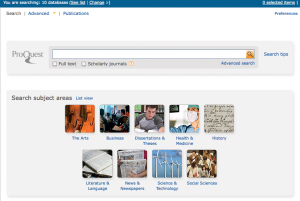
ProQuest (all modules) – ProQuest
A multidisciplinary database with a large number of full text materials including conferences, correspondence, and etc. from journals, newspapers, and books. Also includes a large offering of dissertations, theses, and newspapers. (Click here for info on searching ProQuest).
Pros and Cons:
![]() The most extensive selection of dissertations and theses spanning from 1861 to the present day. Full text is available for most dissertations added since 1997.
The most extensive selection of dissertations and theses spanning from 1861 to the present day. Full text is available for most dissertations added since 1997.
![]() Look through full text issues of the L.A. Times and the New York Times. This is the database to find newspaper articles.
Look through full text issues of the L.A. Times and the New York Times. This is the database to find newspaper articles.
![]() Multi-disciplinary means you’ll be able to find information practically any topic. This makes it a great place to start researching for any class.
Multi-disciplinary means you’ll be able to find information practically any topic. This makes it a great place to start researching for any class.
![]() Not everything written about a particular topic will be found in the ProQuest databases. To do a more extensive, try a subject specific database.
Not everything written about a particular topic will be found in the ProQuest databases. To do a more extensive, try a subject specific database.
![]() Although there are a lot of full text articles, not everything will be available in full text. If you are only given an abstract, click on the “Click here for full text” link (also known as 360 link) – this will search all of our databases to see if the article is available in full text.
Although there are a lot of full text articles, not everything will be available in full text. If you are only given an abstract, click on the “Click here for full text” link (also known as 360 link) – this will search all of our databases to see if the article is available in full text.
![]() The new interface is nice for finding resources but (as of right now) there are issues with the database timing out (even when it really shouldn’t), wasting time and effort.
The new interface is nice for finding resources but (as of right now) there are issues with the database timing out (even when it really shouldn’t), wasting time and effort.
Summary:
Academic Search Premier (by EBSCO) and ProQuest (by ProQuest) are great places to go to begin your research, but they are not always the best places to end. The best place to end is with a subject specific database where you’ll find a more comprehensive list of articles for a particular topic/subject. Not sure which subject specific database to use? The librarians at Pearson Library created research guides that can help you with that: libguides.callutheran.edu.
Need more help? Contact the librarian for that subject: www.callutheran.edu/iss/research/information_specialist.php. We are always happy to meet with you to help you find what you need!
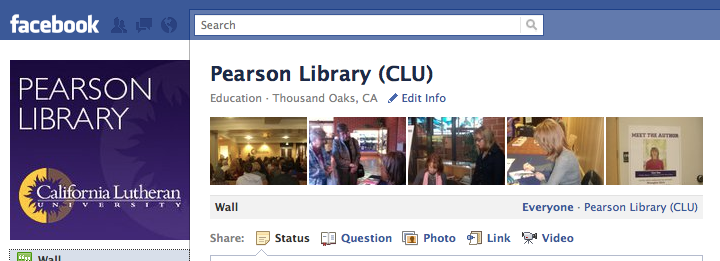
Like the Pearson Library on Facebook.
Mar
28
Turn on the news or your favorite talk show on any given morning and you are likely to hear the talking heads report on some amazing scientific finding about human behavior, nutrition, the latest medical breakthrough or latest medical scare (start popping potassium iodide pills, duct-tape your doors and don that contamination suit because Japanese radiation has been detected in a raindrop in Massachusetts!) Unlike the general population, you know better than to accept as fact the media’s interpretation of scientific findings because you’re taking a research methods course and understand that selecting one assumption out of context from a study is simply bad science.
If you are taking a research methods course in criminal justice, education, psychology, political science, sociology or other discipline, there’s a new tool available to help you make sense of the often complex world of research, and that’s the Sage Research Methods Online Database. Here’s how it works: Let’s say your professor discussed the chi-square test in class, but you want more information. If you search chi-square in this database, you’ll see the “Methods Map” display with links to both broader concepts like quantitative data analysis and inferential statistics and narrower discussions like degrees of freedom and statistical significance. The cool thing is that all of these topics relate back to your original topic, the chi-square test, so you can see in how one concept relates to other concepts.
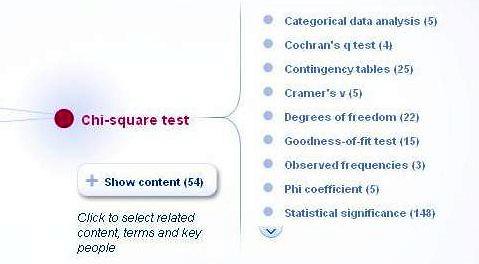
If you’re a sociology major and taking ethnographic research, search on ethnography and you get a similar display of related topics. You’ll see that ethnography is a form of qualitative data analysis and you can link to books, chapters, and articles discussing this broader concept. If you want to dig deeper into ethnographic techniques, simply click on the narrower concepts for autoethnography, field notes, or thick description.
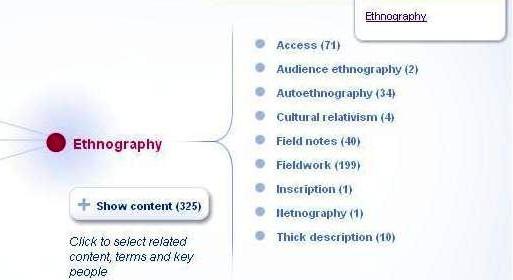
Now, let’s say you’re a psychology major and your professor wants you to find and critique a psychological study with a quasi–experimental design. Right now you can key in your methodology, find links to content on this type of methodology and get a clear understanding of how quasi–experimental studies are designed. Future enhancements will allow this database to link you to actual examples of studies applying these methodologies.

One more feature of the database are brief videos of experts discussing research topics. Let’s say you’re an education major taking action research and want to view a video on action research and participation. Simply key in your terms, select “videos” and you’ll get some immediate results:

So, whether you’re taking a research methods course or just want to know how to better interpret scientific information, the SAGE Research Methods Online database should be your first stop.

Like the Pearson Library on Facebook.
Feb
24
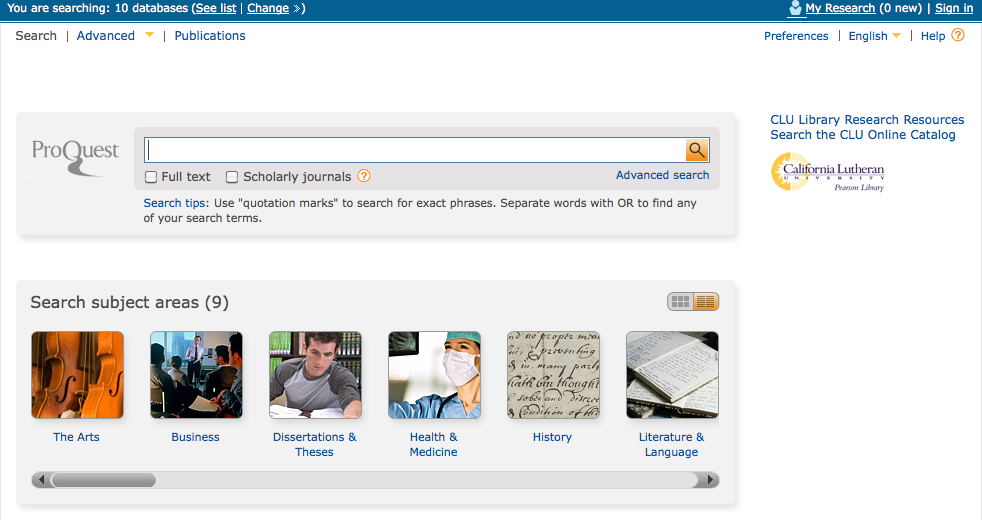
The new ProQuest is definitely a lot snazzier and it’s now easier than ever to search, find, use, and share information. Here are the top 7 most awesome things about the new ProQuest:
(A short definition of ProQuest: A multidisciplinary database with journal, newspaper, and magazine articles as well as book chapters, dissertations and theses, and many other types of documents. Find the database in the library’s A-Z list of databases).
Most awesome thing #1: The easy-to-use search interface
The graphics really add a bit of flair to the basic search interface with two options for searching: type your keywords into the google-like box or click on an image to search by subject areas. Check the boxes to limit searches to full-text and/or scholarly journals.
Most awesome thing #2: The more advanced search option
Sometimes a single box for your keywords just won’t cut it, that’s why an awesome advanced search option is a must! Combine your keywords with the drop-down boolean search options, select a specific field you want that keyword to be searched in (title, author, abstract, etc.), and add as many rows and keywords as you want. Limit your results even more by selecting a specific document type, language, and/or date range. Using the advanced option really makes searching faster and more efficient!
Most awesome thing #3: Saving documents for later use
Keep your searches and documents for easier printing, emailing, and citing by creating an account in ProQuest (they call it MyResearch). Now you can refer back to them and you’ll always know where you got the document from.
Most awesome thing #4: Cite this – not that
There are many citation builders out there such as KnightCite or Citation Machine, but in ProQuest you can click on the article, click on the “Cite This” link and you’re golden. Copy the citation to your bibliography/works cited (of course check to make sure that it’s correct) and you are set to put the final touches on your paper.
Most awesome thing #5: The cute icons indicate document type
Maybe you’re looking for more than scholarly articles so you didn’t check the scholarly journals box and that’s totally cool with us. Know what type of document it is by looking at the icon next to the article’s title.The ones with the graduation cap in front of a square are scholarly articles, ones with a graduation cap and rolled up diploma are dissertations and theses, etc. Hover over the icon to know what each icon is.
Most awesome thing #6: Search within your results to limit results numbers
It’s possible for thousands and thousands of results to show up in the search but of course not all of them will be relevant to what you’re looking for. That’s why there’s the awesome feature to search within your results by clicking on the “Search Within” link right next to the number of results. Now you can type in more keywords to hone in on what you’re looking for.
Most awesome thing #7: Suggested subjects
Liberal arts education requires you to take classes that you may not be familiar with. That’s where the suggested subjects come in handy in this database. All results list with have suggested subject terms to help you find a more specific topic. Additionally, if spelling is an issue for you, auto-fill shows up when you begin typing in a keyword.
There are more interesting and useful tools in the new ProQuest that makes using the database a lot easier and more efficient. What kinds of things have you found useful in ProQuest? We’re interested in knowing!

Like the Pearson Library on Facebook.
Feb
3
Like a baby bird about to take flight for the first time, the Pearson library is also adventuring into new territory. We’ve heard your chirping for extended hours on Friday and Saturday and are happy to feed your hunger for research. The new library hours will start Saturday, February 5th; we will be open until 11:45pm every night of the week. Now you no longer have to be shelled up in your room to get in some egg-tra homework done. Gather your flock and reserve a study room for your group projects or fly by solo to check out a book, do some research, study, or use the computers.
Let’s crack open those books – the library is open late.
Monday – Friday: 8:15am – 11:45pm
Saturday – Sunday: 10:15am – 11:45pm
Here’s a question: If the early bird gets the worm, what does the late bird get from the library?

Found: http://carmichaellibrary.blogspot.com/2009_04_01_archive.html
Jan
28
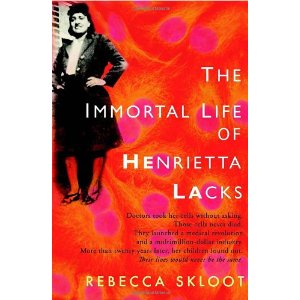
The Immortal Life of Henrietta Lacks by Rebecca Skloot
Find it at the library: RC265.6.L24 S55 2010
Imagine your cells as the key factor in the development of the polio vaccine, treatments for AIDS, and many other medical discoveries, but your family had no idea and neither did you. That was what happened with Henrietta Lacks.
Scientists know her as HeLa. Her cells and the cells of many other cancer patients were collected without their knowledge in the “colored” ward of John Hopkins in the 1950s. All of those collected cells died, except for Henrietta’s; her’s grew, multiplied, and continue to multiply today – 60 years after her death. At first the cells were sent from one scientist to another in small vials, but soon, they were produced and shipped in mass to scientists around the world for experiments. Her family had no idea. It was not until years later when the identify of HeLa cells were revealed as belonging to a poor black woman who lived in the south named Henrietta Lacks, that her family knew about their existence. Journalists, filmmakers, book writers, and everybody wanted to know who she was and what made her cells “immortal”.
Rebecca Skloot, like the others, wanted to know more about the woman behind the cells, “what kind of life she led, what happened to her children, and what she’d think about cells from her cervix living on forever” (p. 2). We follow Skloot in her book to discover the answer to these questions and more. Her book describes to us with details of how she went from wondering about this person in college, to reading about and contacting people who knew the family in Lacks Town (Virgina), and hoe she finally uncovered the story from people who longer trusted anyone asking about HeLa. Although her story is mostly chronological, Skloot switches back and forth between her story to find the answers and Henrietta’s life and story. She describes every detail, making the story even more fascinating: the method and intervals of Radium used to try to treat Henrietta’s cancer, George Gey’s impeccably clean lab and inventions, and physical and personal descriptions of family members. All of these details were interwoven with historical and contextual information, and tidbits about the key characters: their personalities, interests, and quirks.
The story of Henrietta and her cells have been a key factor in our society learning more about illnesses and diseases, and they will be as long as her cells continue to reproduce and multiply. The Immortal Life of Henrietta Lacks by Rebecca Skloot is scientific, historical, genealogical, sociological, anthropological … and just darn good! It is an interesting, unforgettable, and a must-read for everyone.
Jan
24
 Recent violent incidents on local high school campuses and the mass shooting in Tucson, Arizona are traumatic and unnerving to most of us. Although CLU and Thousand Oaks are considered very safe communities, being cautious is always wise. Here are some campus resources to help keep you safe at CLU: The Campus Public Safety department offers tips and contact information for reporting threats and incidents. The site also includes current campus crime data. Add the Campus Public Safety emergency number to your cell phone or mobile device: (805) 493-3911. For non-emergencies call: (805) 493-3208. The Campus Conduct Hotline is designed to minimize any apprehension you may have and make it possible for you to report concerns about issues or behaviors that pose a risk to CLU or its students, staff, or faculty. Campus Public Safety. Other campus sources for confidential help include: Campus Life, Campus Ministry, Student Counseling Services, and Health Services. For objective research on crime, the gun control debate, or perspectives on mental health, start with the Opposing Viewpoints Resource Center. The Criminal Justice research guide will also lead you to databases, Web sites, and sources for statistical data.
Recent violent incidents on local high school campuses and the mass shooting in Tucson, Arizona are traumatic and unnerving to most of us. Although CLU and Thousand Oaks are considered very safe communities, being cautious is always wise. Here are some campus resources to help keep you safe at CLU: The Campus Public Safety department offers tips and contact information for reporting threats and incidents. The site also includes current campus crime data. Add the Campus Public Safety emergency number to your cell phone or mobile device: (805) 493-3911. For non-emergencies call: (805) 493-3208. The Campus Conduct Hotline is designed to minimize any apprehension you may have and make it possible for you to report concerns about issues or behaviors that pose a risk to CLU or its students, staff, or faculty. Campus Public Safety. Other campus sources for confidential help include: Campus Life, Campus Ministry, Student Counseling Services, and Health Services. For objective research on crime, the gun control debate, or perspectives on mental health, start with the Opposing Viewpoints Resource Center. The Criminal Justice research guide will also lead you to databases, Web sites, and sources for statistical data.
Jan
11
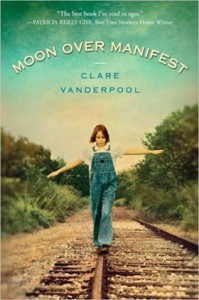 Did you know? The Newbery Medal is the world’s first and oldest children’s book award. It has been handed out annually by the Association for Library Service to Children (ALSC), a branch of the American Library Association (ALA), since 1922. Any book published in America for children can be nominated during the first year of its publication. Chances are you have read at least some medal winners of the past. Particularly famous titles of past medal winners include Adam of the Road, Johnny Tremain, Strawberry Girl, King of the Wind, Island of the Blue Dolphins, A Wrinkle in Time, Bridge of Terabithia, and The Giver. The 2011 Newbury Medal winner is Moon Over Manifest by Clare Vanderpool.
Did you know? The Newbery Medal is the world’s first and oldest children’s book award. It has been handed out annually by the Association for Library Service to Children (ALSC), a branch of the American Library Association (ALA), since 1922. Any book published in America for children can be nominated during the first year of its publication. Chances are you have read at least some medal winners of the past. Particularly famous titles of past medal winners include Adam of the Road, Johnny Tremain, Strawberry Girl, King of the Wind, Island of the Blue Dolphins, A Wrinkle in Time, Bridge of Terabithia, and The Giver. The 2011 Newbury Medal winner is Moon Over Manifest by Clare Vanderpool.
Moon Over Manifest by Clare Vanderpool
After a life of riding the rails with her father, 12-year-old Abilene can’t understand why he has sent her away to stay with Pastor Shady Howard in Manifest, Missouri, a town he left years earlier; but over the summer she pieces together his story. In 1936, Manifest is a town worn down by sadness, drought, and the Depression, but it is more welcoming to newcomers than it was in 1918, when it was a conglomeration of coal-mining immigrants who were kept apart by habit, company practice, and prejudice. Abilene quickly finds friends and uncovers a local mystery. Their summer long “spy hunt” reveals deep-seated secrets and helps restore residents’ faith in the bright future once promised on the town’s sign. Abilene’s first-person narrative is intertwined with newspaper columns from 1917 to 1918 and stories told by a diviner, Miss Sadie, while letters home from a soldier fighting in WWI add yet another narrative layer. Vanderpool weaves humor and sorrow into a complex tale involving murders, orphans, bootlegging, and a mother in hiding.*
Moon Over Manifest will soon be added to CLU’s Newbury Medal winner collection which can be located in the juvenile children’s section. This collection holds a number of other past Newbury Medal winners, Caldecott winners, and a number of other fine books for young readers.
* This description and cover has been taken from amazon.com and may have been edited.
Jan
10

What is your new years resolution? Every year, millions of people commit themselves to some sort of lifestyle-improvement plan for the upcoming year. Resolutions can include getting out of debt, finding a new (better) job, and working harder for better grades. The most popular new years resolution is (of course) to get fit, including exercise more, quit smoking, drink less alcohol, or eat better. The library has tons of resources to help you keep your new years resolutions and improve your life.
Here’s a “taste” as to what books and eBooks you can check out:
–Natural foods cookbook by Beatrice Trum Hunter (find in the library: TX715 .H899)
–Exercise: A Program You Can Live With published by Harvard Health Publications (an eBook)
–Essentials of strength training and conditioning with Editors: Thomas R. Baechle, Roger W. Earle (REF GV711.5 .E88 2008)
–Nutrition : concepts and controversies by Frances Sizer Webb (REF QP141 .S5365 2008)
–Healthy Eating: A Guide to the New Nutrition published by Harvard Health Publications (an eBook)
–101 Championship Baseball Drills by Glenn Cecchini (eBook)
Databases are great also. Ever wonder if a Nintendo Wii actually works as a good form of exercise? SportsDiscus Full Text, a comprehensive database covering the topics of physical fitness, sports medicine, physical education, kinesiology, training, nutrition, and much more, can help you answer that question. A keyword search for “Wii and exercise” came up with 34 results. One article by the American Council of Exercise’s (ACE’s) study on the health advantages of playing Wii Sport. The study concluded that by playing Wii Sport calories were “expended due to increased heart rate, oxygen intake and exertion. The energy expenditure per 30 minutes included 216 for boxing, 159 for tennis and 135 for bowling. However, chief science officer Cedric X. Bryant concludes that there is no replace for the real sport.” However, many studies also mention that playing active video games can play a role in maintaining or losing body weight. Basically: some exercise is better than no exercise.
Don’t be part of the 88% of people whose new years resolutions end in failure. Let the Pearson Library provide you with resources to help you achieve your new years resolution to get fit and live healthy.
Dec
13
Where can you go to find high-quality images of Native Americans and Inuits, information on the paper & pulp industries, and peer reviewed articles in the sciences? Wilson Web has information all of those topics and more. Here are some cool things that is offered by Wilson Web for your research and fun & enjoyment.
Reason #5: Search Multiple Databases
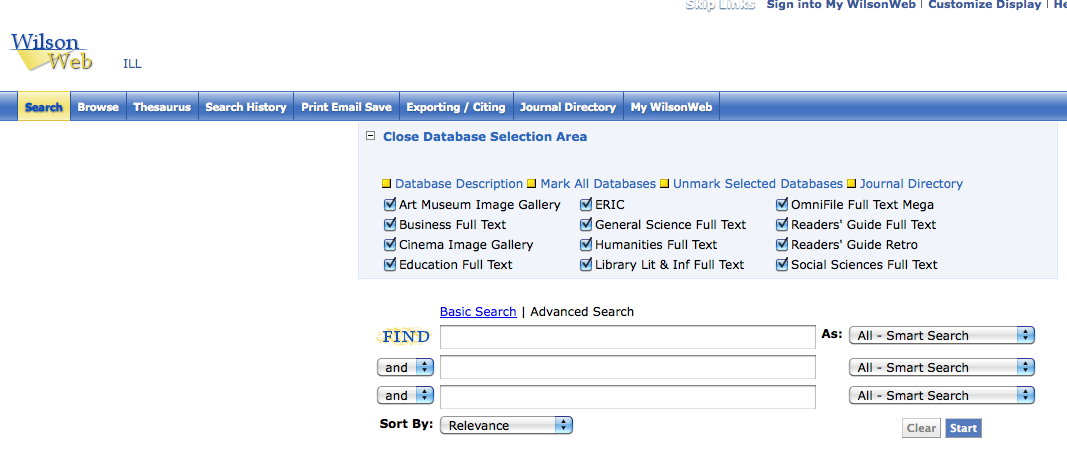
Search across multiple databases from one user interface will save you time and effort. The Wilson Web hosted databases owned by the library include: Art Museum Image Gallery, Business Full Text, Cinema Image Gallery, Education Full Text, ERIC, General Science Full Text, Humanities Full Text, Library Literature and Information Full Text, OmniFile Full Text Mega, Readers’ Guide Full Text, Readers’ Guide Retro, and Social Sciences Full Text.
Reason #4: Get Full-Text Everytime 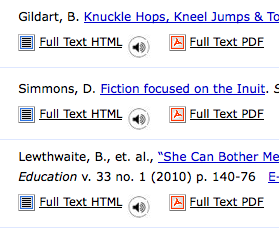
Get full text of articles. All of the databases in Wilson Web offers full text of articles because sometimes it’s frustrating to find an article and now be able to get the full text right when you want it.
Reason #3: One Second Translations
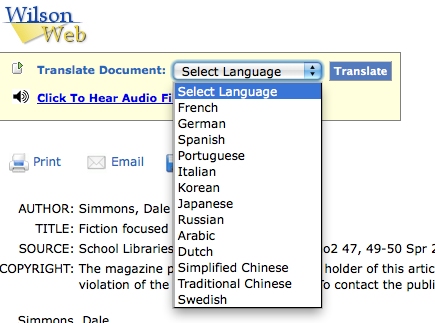
Can’t read English well or prefer to read your articles in another language? Wilson Web allows you to do that in 13 different languages, including French, Russian, and Japanese. At the top of the screen click to see the pull-down menu and choose the language of your choice. The translation will be word-for-word translation but will help you understand the gist of the article.
Reason #2: It’s Always Movie Night
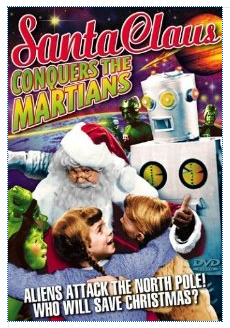
Watch old movies and see photos from the film or TV sets, the actors, and much more with the Cinema Image Gallery. Have you ever seen Santa Claus Conquers The Martians from 1964? It’s the classic tale of martians kidnapping Santa because there is nobody on Mars to give their children presents. Watch the entire movie and find out how the movie ends — all for the price of FREE.
Reason #1: Hear the Article
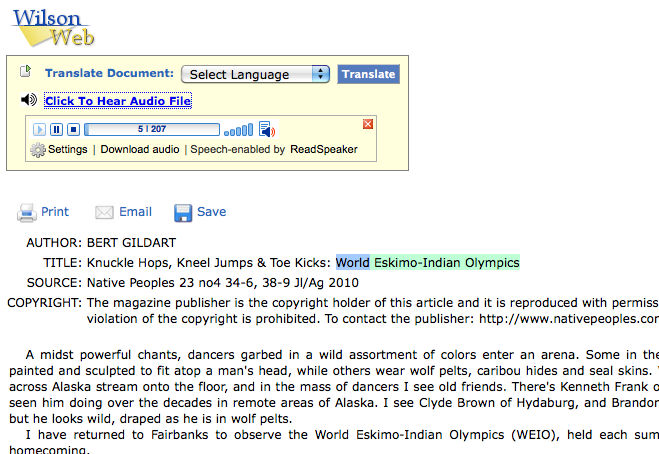
Don’t read the article, let Wilson Web read the article to you! If the article is available in HTML Full Text, choose that option and then click on “Click here to hear audio file” and get the article read to you in a computerized voice. What’s more fun and useful than that?
We want to hear from you – what have you found about Wilson Web that you’ve liked?
Dec
9
 Finals are here and you feel the stress building up. Don’t panic! The key to surviving is to be calm and rested, get organized, and get help if you feel you need it. There are many good resources on campus, in the Pearson Library and on the Web that can help you tackle finals week. Let’s take a look at some excellent resources. On campus counselors at the Center for Academic and Accessibility Resources (CAAR) can help you with study tips, handle stress and provide you with general academic guidance. Don’t forget to visit the Writing Center if you need help in polishing that term paper. If personal problems or health issues are impacting your ability to study–don’t delay–get an appointment with Student Counseling Services or Health Services. Now, if you need some study tips, the library has plenty of resources to help you out. Search the ebrary database and use the key words “study skills” and you’ll find Test Taking Strategies & Study Skills for the Utterly Confused and other books on studying and test taking. On the Web, About .com has a number of practical articles including: A Student’s Guide to Surviving College Finals. Good luck and enjoy winter break!
Finals are here and you feel the stress building up. Don’t panic! The key to surviving is to be calm and rested, get organized, and get help if you feel you need it. There are many good resources on campus, in the Pearson Library and on the Web that can help you tackle finals week. Let’s take a look at some excellent resources. On campus counselors at the Center for Academic and Accessibility Resources (CAAR) can help you with study tips, handle stress and provide you with general academic guidance. Don’t forget to visit the Writing Center if you need help in polishing that term paper. If personal problems or health issues are impacting your ability to study–don’t delay–get an appointment with Student Counseling Services or Health Services. Now, if you need some study tips, the library has plenty of resources to help you out. Search the ebrary database and use the key words “study skills” and you’ll find Test Taking Strategies & Study Skills for the Utterly Confused and other books on studying and test taking. On the Web, About .com has a number of practical articles including: A Student’s Guide to Surviving College Finals. Good luck and enjoy winter break!